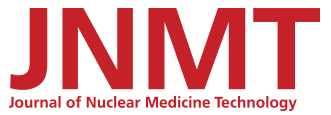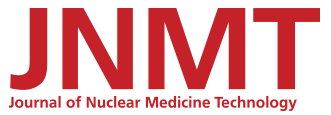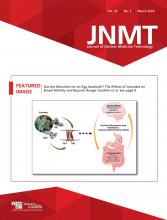Over the past 6 months, SNMMI-TS has been working on innovative new programs and advancing important initiatives. This year we will introduce several new educational offerings as well as new initiatives that expand across imaging modalities. We have strengthened our connections with our international colleagues and continued our efforts to build and renew the workforce pipeline into the field. As we work through Year 1 of the strategic plan, there is still a lot to be done! I am thrilled to share some highlights with you.
In mid-January, the SNMMI-TS announced the new SNMMI-TS Launch Pad program: a $15,000 grant to be awarded to one or more SNMMI-TS members to support an innovative new project or program that will transform technologist education, outreach, advocacy, or pipeline efforts. Recognizing that the field of nuclear medicine and molecular imaging is changing rapidly, the SNMMI-TS identified our vision for the future as being able to drive change within hospitals, institutions, and academia to better educate and advocate for the field of nuclear medicine and molecular imaging; therapy will be practiced in all hospitals around the country, and nuclear medicine technologists—as key members of the care team—will use their enhanced expertise in precision medicine to collaboratively improve patient outcomes. The Launch Pad grant will serve as a “launching” point for this vision—hopefully the first of many new and innovative projects our members will imagine and create. Applications closed March 1; award notifications will be sent by April 1, with project completions by September 30.
The SNMMI-TS Molecular Therapy Task Force (Joby MacLean, chair; Jay Smith, vice-chair; Dmitry Beyder, leadership liaison) has been busy planning the first Technologist Theranostics Tumor Board (T3B). The goal of this project is to allow technologists to learn and better understand their vital role in theranostics. These “technologist tumor boards” will be reactive case discussions (lessons learned) and will outline the role of technologists in therapy, what concerns they had, what could have been done differently, and what could be done in the future to ensure a higher success rate (scheduling, infusion techniques, collaborations with other entities, etc.). The first T3B was scheduled for February 27, with leads Dmitry Beyder (Barnes-Jewish Hospital; SNMMI-TS President), Michael Harrod, and Vikas Prasad (both from Washington University School of Medicine). The initial paperwork has been submitted for VOICE/CME approval and will focus on these 3 objectives:
Understand key components to consider when treating patients with 177Lu-PSMA.
Be able to make patients more prepared and comfortable during workup for and receipt of PSMA therapy.
Better respond to challenges that occur in a clinical practice when delivering radiopharmaceutical therapy.
Throughout their discussions, the Molecular Therapy Task Force felt it was KEY to collaborate and partner with the institutions awarded SNMMI Therapy Center of Excellence status and the SNMMI Therapy Centers of Excellence. With the goal of hosting a T3B event quarterly, the SNMMI-TS Molecular Therapy Task Force has reached out to the president of the Therapy Center of Excellence for help and collaboration in identifying potential institutions and individuals who may be willing to lead the next event (sometime in May or June).
Dmitry D. Beyder, MPA, CNMT
The University of Alabama at Birmingham (UAB) has launched Nuclear Medicine and Molecular Therapy Intensive (NMMTI). SNMMI-TS is excited to be partnering with UAB on this effort and marketing the program to members. The program’s mission is to provide qualified individuals with the knowledge and skills needed to succeed in their clinical career and to better prepare them for the future of nuclear medicine. The NMMTI emphasizes a generalist approach so that students can apply these skills to many areas of therapy in the field. The week-long, fast-paced, intensive program includes lectures, hands-on skills, labs, and interactive activities. The NMMTI will hold this workshop from April 29 through May 3, 2024. The complete, tentative schedule can be found at https://www.uab.edu/shp/cds/images/documents/nmmis/UAB-NMMTI-Schedule.pdf.
UAB is also working to reignite the Nuclear Medicine Advanced Associate (NMAA) program. The NMAA program is on the agenda for the Alabama Board of Trustees meeting in Huntsville, Alabama; the SNMMI-TS and SNMMI plan to submit a letter of support ahead of the meeting. Once approved, the goal is to reopen the program before or during 2026.
The SNMMI-TS Advocacy Committee and the State TAG Team have been working tirelessly over the past 6 months to address state licensure issues and develop a plan for outreach within the chapters. During this spring and fall, the SNMMI-TS will contact chapters to request time at chapter meetings for members to meet with their state TAGs. The SNMMI-TS will be providing $250 per TAG to reimburse expenses and asking chapters to waive meeting registration fees to help reduce TAG expenses. The goal of this outreach effort is to ensure that chapter members know their state TAGs so they can contact them if issues arise in their state. We also hope to provide advocacy-related education to chapter meeting attendees regarding ongoing state issues. We are currently following legislation in Georgia, Indiana, Louisiana, New Hampshire, Ohio, Pennsylvania, and Washington, DC.
The 15th annual SNMMI-TS Leadership Academy was held in conjunction with the SNMMI Mid-Winter Symposium, January 31 through February 3 in Orlando, Florida. The Leadership Academy has been the centerpiece of SNMMI-TS leadership development strategy, actively working on building a team of approximately 15 technologists per year who have demonstrated leadership abilities and engagement at the national/chapter level. This year, the individuals below graduated from the 2024 academy. Congratulations to all!
Leila Alsarag, CNMT (Missouri Valley Chapter)
Fernando Anleu-Escobar, CNMT (Central Chapter)
Jason Cohen, CNMT (Pacific Southwest Chapter)
Danielle Deimer, Med, BS, CNMT, RT(N) (New England Chapter)
Jill Holmquist, CNMT, PET, NMTCB(RS) (Southeastern Chapter)
Summer Khairi, MBA, CNMT (Southwestern Chapter)
Jared LeBlanc, CNMT (New England Chapter)
Carol Long, CNMT (Southeastern Chapter)
Shari Moreau, RT(N)(ARRT) (Mid-Eastern Chapter)
Christopher Morgan (Greater New York Chapter)
Margaret O’Krafka* (Eastern Great Lakes Chapter)
Brianna Reidel* (Greater New York Chapter)
Jeremy Slicker, CNMT, NMTCB(RS) RT(N) (Southeastern Chapter)
Courtney Tronca (New England Chapter)
Isa Weizenegger* (Southwestern Chapter)
Ryan Widener, MBA, CNMT, RT (Southeastern Chapter)
Lindsay Williams, MBA, ARRT(N)(CT), CNMT (Southwestern Chapter)
*denotes student attendee
We are off to a fast start in 2024, with efforts focused on the 2023 SNMMI-TS Strategic Plan. While much of the current work is around goals 1, 3, and 4 (new technologies, workforce pipeline, and advocacy, respectively), we also continue to look forward and set our eyes for the future beyond this year. We continue to engage our committees, chapters, liaisons, professional partners, and Value Initiative Industry Alliance partners to cover all 6 of our strategic goals and make sure that the profession, our members, and patients are well cared for in the years to come. Please support our work so molecular imaging can continue to be an integral part of the healthcare delivery system.








